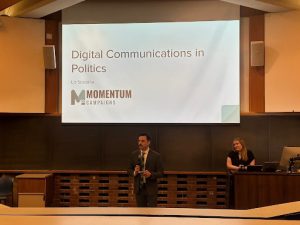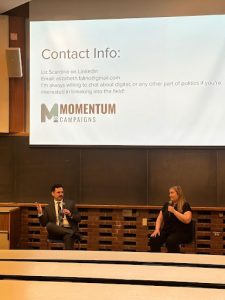On Sept. 2, students gathered in Dana Lecture Hall on Constitution Day to learn about political campaigning from political strategist Elizabeth Scardina.
Scardina started by explaining the importance of being well-connected in politics. An experienced lawyer with many wealthy clients is likely to have an easier time compiling a list of donors to launch their campaign.
In comparison, a small-town farmer will likely begin their campaign by racking up debt, as they try to gain momentum for their campaign.
Early on, politicians who lack a network often rely on inheriting a list from a previous campaign or purchasing a campaign list, with the hope of building a reliable network.
After gaining some momentum, these politicians use the money gained during that period to pay off debt and capitalize.
Scardina then pivoted to discussing the importance of authenticity in politics. In our current political context, people often distrust politicians and perceive them as fake; being real is considered political gold.
She then showed students examples of politicians whose messaging wasn’t authentic. The most notable example was 2016, when Hillary Clinton notoriously said, “Pokemon to the Polls.”
After a few more examples and laughs, Scardina began taking questions, starting with Dr. Samuel Rhodes, Moravian political science professor, who helps coordinate the event.
Rhodes was concerned with how public officials can engage in reasoned discourse in an era dominated by virality; a boring outline of a politician’s student loan plan is much less likely to get attention than accusing Haitian refugees of eating the cats and dogs.
Scardina explained that the best way to communicate would be through personal stories that can emotionally resonate with voters on the politician’s end. At the same time, if voters want to be more effective citizens when voting, they should read credible institutions like The New York Times, The Wall Street Journal, or other reputable sources, rather than relying on social media platforms like Facebook, Instagram, and TikTok.

Another student asked about how AI will affect political campaigns. Scardina explained that AI is not yet capable of doing her job, but it will only improve. Then she explained that deepfakes and other dangerous new political slanders made possible by AI are a part of our new reality.
Scardina then answered a question regarding the breakdown of professionalism in politics over time by explaining that much of this is due to social media rewarding the loudest, often least polished voices.
Afterward, a student inquired about whether there would be backlash to social media changing politics and a potential return to old political communication. Scardina explained that it is highly unlikely, especially in a world after President Donald Trump. Social media is a valuable political tool that is highly effective at persuading, connecting with, and mobilizing voters.
Another student asked how anonymity and algorithms that amplify outrage affect political campaigning, as well as the ethical issues associated with Scardina’s job in the country’s current political moment.
Scardina responded by explaining how there is a hefty ethical struggle within the profession regarding this issue. She explained how urgency is the most effective way to get donations, especially from small-dollar donors. This has led to several firms using the most predatory and harmful political tactics to raise money. She then explained that the tricky thing is threading the needle between what works and what’s ethical.
Rhodes then recommended two books to the audience, Cyber War by Kathleine Jamieson and the Outrage Industry by Sarah Sobieraj (Reeves has copies of both), which extensively examine these issues.

Constitution Day encourages students to think critically about how technology, money, and networking work in political campaigns, while also leaving students with ethical and moral questions to consider, such as how social media and a political culture fixated on outrage and virality impact our democracy.
It prompted students to choose reason over outrage, civic virtue over advantage, and thoughtfulness over impulsiveness when reacting to political media.








